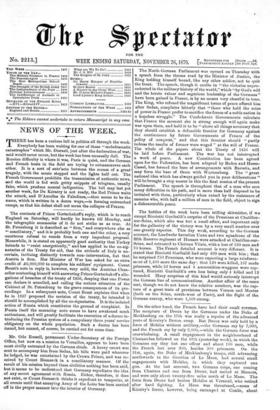The North-German Parliament was opened on Thursday with a speech
from the throne read by the Minister of Justice, the King holding himself bound, like any other soldier, not to quit the front. The speech, though it exults in "the victories unpre- cedented in the military-history of the world," which "by God's will and the heroic valour and sagacious leadership of the Germans" have been gained in France, is by no means very cheerful in tone. The King, who refused the magnificent terms of peace offered him after Sedan, complains bitterly that "those who hold the reins of power in France prefer to sacrifice the forces of a noble nation in a hopeless struggle." The Confederate Governments calculate that France the moment she is strong enough will again make war upon them, and hold it to be "above all things necessary that they should establish a defensible frontier for Germany against the continuance by future Governments of France of the policy of conquest," and that this frontier should "partly redress the results of former wars waged" at the will of France. The whole of the papers about the Treaty of 1856 will be laid before Parliament. The war has not interrupted a work of peace. A new Constitution has been agreed upon for the Federation, has been adopted by Baden and Hesse- Cassel, has formed the base of arrangements with Bavaria, and may form the base of those with Wiirtemburg. The "great national idea which has always guided you in your deliberations" will be brought a step nearer in this the final session of the present Parliament. The speech is throughout that of a man who sees many difficulties in his path, and is more than half disposed to be irritated with them, particularly when raised by the resistance of enemies who, with half a million of men in the field, object to sign a dishonourable peace.


































